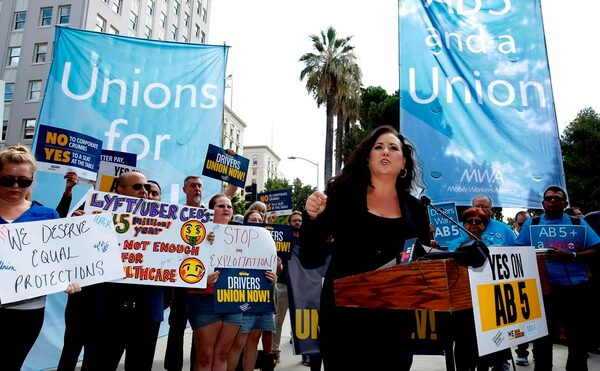
Assembly woman Lorena Gonzalez, D-San Diego speaks at rally calling for passage of her measure to limit when companies can label workers as independent contractors at the Capitol in Sacramento, Calif. on Aug 28, 2019. California is suing Uber and Lyft, alleging they misclassified their drivers as independent contractors under the state's new labour law.The Associated Press
California and three of its largest cities on Tuesday sued Uber Technologies Inc. and Lyft Inc., accusing them of classifying their drivers improperly as independent contractors instead of employees, evading workplace protections and withholding worker benefits.
The suit, joined by Los Angeles, San Francisco and San Diego, was brought under a new state law intended to protect workers in what’s referred to as the gig economy. It argued the companies’ misclassification harms workers, law-abiding businesses, taxpayers and society more broadly.
The controversial law strikes at the heart of the business model of technology platforms such as Uber, Postmates, Lyft, DoorDash and others who rely heavily on the state’s 450,000 contract workers, not full-time employees, to drive passengers or deliver food through app-based services.
Shares in Uber and Lyft dropped briefly but recovered shortly after the lawsuit was announced during a virtual news conference by the attorneys-general.
Uber shares were up more than 2 per cent and Lyft was down half a percentage point in a broadly positive market.
Uber in a statement said it will contest the action in court, while pushing for the implementation its own proposal for additional driver benefits.
“At a time when California’s economy is in crisis with four million people out of work, we need to make it easier, not harder, for people to quickly start earning,” the company said.
Lyft in a statement said it would work with the attorney-general and mayors, “to bring all the benefits of California’s innovation economy to as many workers as possible.”
Uber in December sued to block the new law, which is known as AB5, arguing that it singled out and punished app-based companies.
The companies in the past have said their drivers were properly classified as independent contractors, adding that the majority of them would not want to be considered employees, cherishing the flexibility of on-demand work.
California Attorney General Xavier Becerra said Uber and Lyft drivers lacked basic worker protections, including sick leave and overtime payment, with the lack of a safety net laid bare during the coronavirus crisis.
“American taxpayers end up having to help carry the load that Uber and Lyft don’t want to accept. These companies will take the workers’ labor, but they won’t accept the worker protections,” Becerra said.
Becerra also referred to Uber’s and Lyft’s push to include its drivers in a federal coronavirus relief bill for unemployment benefits. Those benefits are generally reserved for workers whose employers pay into the unemployment insurance system, which Uber and Lyft do not.
Your house is your most valuable asset. We have a weekly Real Estate newsletter to help you stay on top of news on the housing market, mortgages, the latest closings and more. Sign up today.